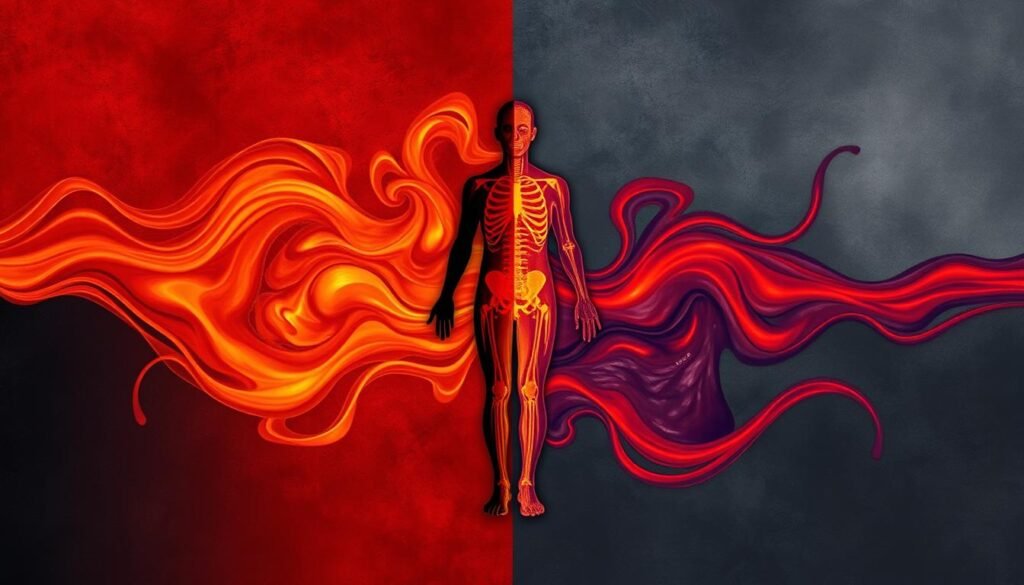About one in six people with rheumatoid arthritis (RA) suffer from severe fatigue. This symptom can affect daily life more than joint pain. Many don’t talk to their healthcare providers about their fatigue, leading to problems that aren’t addressed.
It’s important to understand how rheumatoid arthritis and fatigue are connected to manage symptoms well. Fatigue in RA can come from many sources, like inflammation, how pain is felt, and mental health issues. It makes dealing with RA complicated for both patients and their doctors. By tackling symptoms head-on, patients can feel more energetic and enjoy life better, despite RA’s challenges.
Key Takeaways
- About one in six RA patients experience severe fatigue.
- Fatigue can disrupt daily life more than joint pain.
- Many patients do not discuss fatigue with their healthcare providers.
- Effective management strategies can improve energy levels and quality of life.
- Understand the underlying factors contributing to fatigue in RA.
Understanding Rheumatoid Arthritis
Rheumatoid arthritis is a severe autoimmune disorder. It causes chronic joint inflammation and affects millions around the world. It mainly harms joints like those in the hands and knees, causing pain and swelling.
This can lead to serious joint damage and even disability. The disease affects people differently worldwide. For instance, in India, about 0.7% of the population, or roughly 10 million people, have it.
Over 70% of these individuals also suffer from fatigue. This makes their daily activities much harder. Understanding rheumatoid arthritis is crucial, as it’s more than just a joint problem. It affects the whole body, leading to high fatigue levels in over 40% of patients.
| Statistic | Percentage/Value |
|---|---|
| Global frequency of rheumatoid arthritis | 0.3-1.0% |
| Prevalence in India | 0.7% |
| Estimated individuals in India | ~10 million |
| Patients experiencing fatigue symptoms | >70% |
| Patients reporting fatigue as a top priority | Not specified |
| Median fatigue level among subjects | High |
| Distribution of disease duration (≤5 years) | 67% |
| Mean disease activity score (DAS) | 4.96 |
| Mean activity of daily living (ADL) score (subjects) | 11.64 |
| Mean ADL score (controls) | 2.42 |
| Global fatigue index mean (subjects) | 33.16 |
| Global fatigue index mean (controls) | 14.41 |
| Percentage experiencing chronic pain within 5 years | 75% |
What is Fatigue in the Context of Rheumatoid Arthritis?
Fatigue is common in people with rheumatoid arthritis (RA), with about 90% affected. It’s a major part of managing RA. Chronic fatigue in RA isn’t just from exertion. It comes from the body fighting inflammation. Up to 40% of RA patients face severe fatigue, showing how hard it can be.
Handling fatigue in RA is tricky due to its link with other symptoms. Even with pain control, fatigue is still a big problem for patients, say 93% of rheumatologists. Fatigue often doesn’t match up with inflammation markers. But it’s closely linked to how patients feel and their reported joint pain.
Fatigue does more than make you feel tired. It can limit what you do each day and affect your social life. It often leads to not working and visiting doctors more. Persistent fatigue can make treatments feel less effective, as it keeps patients feeling worn out.
The connection between fatigue, pain, and how patients feel is important. It shows why a tailored approach to handling fatigue is best. Understanding fatigue’s impact helps patients and doctors work better together for improved health.
Rheumatoid Arthritis and Fatigue: Impact on Daily Life
People with rheumatoid arthritis (RA) deal with many challenges every day. Fatigue is a big problem for them, more than just tiredness. It affects their whole life in a big way. They struggle in personal relationships, at work, and doing everyday things because of this fatigue.
How Fatigue Affects Quality of Life
Fatigue is a huge issue for those with RA. It makes keeping up with friends and work harder. Even simple tasks become tough, leading to frustration and feeling alone. This drop in life quality hurts their social life and work performance. But, getting enough sleep and reducing stress helps manage this fatigue.
Comparison with Other Symptoms
Fatigue is often worse than other RA symptoms like joint pain and stiffness. It messes with mental focus and daily life more than the pain does. Fatigue is constant, harming sleep and adding to the tiredness. Addressing fatigue is key for better management of RA. For more tips on coping, here’s a useful article on managing fatigue.
| Symptom | Impact on Daily Life | Management Strategies |
|---|---|---|
| Fatigue | Reduces social interactions and work productivity | Good sleep, energy conservation techniques |
| Joint Pain | Limits mobility and physical activity | Medication, physical therapy |
| Stiffness | Compromises morning routines and overall comfort | Regular stretching, warm-ups |
In summary, RA fatigue is about more than being tired. It touches every part of life. Seeing its impact is the first step to living better.
Symptoms of Fatigue in Rheumatoid Arthritis
Fatigue greatly affects those with rheumatoid arthritis (RA). More than 75% have fatigue. It shows up in many ways. Knowing these fatigue types helps manage and care for it.
Chronic Fatigue vs. Regular Exhaustion
Chronic fatigue and regular exhaustion are not the same. Regular tiredness goes away with rest. But, chronic fatigue sticks around. It can make life tougher, causing more joint pain and less energy.
About 40% of people with RA face chronic fatigue. Sleep doesn’t help them recover. This makes their daily routines harder to handle.
Physical and Mental Symptoms
RA fatigue affects both body and mind. On the physical side, people often feel:
- Low energy levels
- Morning stiffness
- Chronic pain
On the mental side, there might be:
- Concentration problems
- Mood swings, including anxiety and depression
Mental and physical fatigue can worsen each other. So treating both types is crucial. It helps people manage their symptoms better.

| Aspect | Chronic Fatigue | Regular Exhaustion |
|---|---|---|
| Duration | Persistent, may last for months | Temporary, resolves with rest |
| Impact | Greatly disrupts daily activities | Has a small effect on daily tasks |
| Associated Symptoms | Chronic pain, mood changes, reduced function | Usually just feeling physically tired |
Underlying Causes of Fatigue in Rheumatoid Arthritis
Understanding the fatigue causes in rheumatoid arthritis (RA) is vital. Fatigue in RA stems from many factors. These include disease activity, pain, and mental health.
About 74% of people with RA face constant fatigue. This shows how big of an issue it is.
Some arthritis meds, like antidepressants and painkillers, can make you tired. They make you sleepy, which affects your daily life. Up to two-thirds of arthritis patients might have anemia of chronic disease. This problem happens when inflammation messes with red blood cell production, causing fatigue.
Being overweight and depressed can also affect fatigue levels. Obesity can make you feel more tired during the day. According to Current Rheumatology Reports, things like sleep problems and mental health issues can impact fatigue more than the arthritis itself. Managing RA well means looking at the whole person, not just the symptoms.
The link between pain and fatigue is important. Pain is a big reason for fatigue. It keeps these symptoms going. If you sleep better, you might feel less tired.
The following table summarizes main factors that affect fatigue in rheumatoid arthritis:
| Factor | Description |
|---|---|
| Medication | Some arthritis medications can cause drowsiness or fatigue. |
| Anemia of Chronic Disease | Inflammation stops red blood cells from being made, leading to more tiredness. |
| Obesity | Higher body weight leads to more fatigue, even if you sleep well. |
| Depression | This mental health issue is often linked to more fatigue in RA patients. |
| Pain | It’s a big sign of how bad and how long fatigue will last. |
| Poor Sleep Quality | Bad sleep is often connected to feeling more tired. |
Connection Between Inflammation and Fatigue
The link between inflammation and fatigue greatly affects those with rheumatoid arthritis. It’s a complex relationship that deals with the body’s autoimmune response and its impact on energy. Understanding this connection is vital for managing symptoms effectively.
The Role of Autoimmune Response
Rheumatoid arthritis sets off a systemic inflammation. This is due to the autoimmune response producing pro-inflammatory cytokines. These cytokines are central to developing fatigue as they boost inflammation levels.
Even though inflammation and fatigue levels don’t always match up, joint pain can really affect energy. For example, more swollen and tender joints can lead to more fatigue. This shows how deeply inflammation can impact day-to-day activities.
Joint Pain and Its Effect on Energy Levels
Joint pain from rheumatoid arthritis makes it hard to keep energy up. Patients often feel their energy zapped by continuous pain and lack of good rest. Surprisingly, about 34% of patients feel very tired even when their disease seems under control.
Their fatigue greatly affects their life and health. Research shows a link between the severity of fatigue and inflammation markers. This highlights the need for specific ways to handle these issues. Bad eating habits, not enough sleep, and being overweight can also add to the fatigue and slow down recovery.

To learn more about how inflammation leads to fatigue in rheumatoid arthritis, check out this in-depth article. It covers additional topics like joint pain and energy in the setting of various health issues, showing how these symptoms are closely connected. For more on managing fatigue, visit this resource.
Managing Fatigue: Strategies and Treatments
People with rheumatoid arthritis often struggle with fatigue. Finding effective strategies can really help ease these tired feelings. Exercise is key, boosting well-being and energy levels through different activities. Making changes to your lifestyle is also crucial for managing fatigue better.
Exercise and Physical Activity
Regular exercise is a big help for fighting fatigue. Even gentle activities like walking, swimming, or yoga can boost your energy over time. Starting with short activities and slowly doing more helps make exercise a regular habit. Studies show that staying active can ease RA symptoms and make daily tasks easier.
- Stretching and flexibility exercises
- Light weight lifting
- Swimming
- Walking
- Tai Chi
- Yoga
These exercises improve strength, making everyday activities easier. If you’re looking for advice that fits you, talking to a physiotherapist is a great idea. They can offer guidance suited to your needs.
Healthy Lifestyle Modifications
Changing your lifestyle for the better is also key to controlling fatigue. Eating a balanced diet, with protein in the morning, light lunches, and healthy snacks can keep your energy up. Drinking lots of water helps reduce joint pain and boosts your energy, too.
Getting good sleep is crucial for fighting tiredness. Managing stress with problem-solving, mindfulness, and group support can also help lessen fatigue related to rheumatoid arthritis.
| Lifestyle Modification | Benefit |
|---|---|
| Balanced Diet | Prevents fatigue and increases energy levels |
| Hydration | Reduces joint pain, boosting energy |
| Sleep Hygiene | Improves sleep quality, decreases fatigue |
| Stress Management | Minimizes fatigue through emotional regulation |
Adding these exercise plans and lifestyle changes can make a big difference in managing fatigue for those with rheumatoid arthritis. Focusing on both physical activity and overall well-being offers a well-rounded way to tackle this common issue.
Medications and Fatigue
Medications are crucial for controlling rheumatoid arthritis (RA) and symptoms like fatigue. However, some can make you feel more tired. Knowing how medications for RA impact your energy allows better treatment choices.
How Common Arthritis Medications Contribute
RA medicines affect energy differently. Methotrexate, for example, may increase fatigue in patients. Over half of RA sufferers report extreme tiredness, often due to their medications.
Chronic pain and low mood are common in those feeling very tired. Certain treatments, especially NSAIDs and biologics, can worsen fatigue. Early treatment with methotrexate and prednisone can lessen fatigue by reducing inflammation.
Managing Co-existing Conditions
Other health problems can make RA fatigue worse. Anxiety, depression, and anemia can make it tough to manage. Tackling these issues as part of your care improves energy levels.
CBT and better sleep can help fight fatigue. Eating well, staying hydrated, and exercising are key to a full approach in reducing tiredness.
The Importance of Sleep and Its Impact on Fatigue
Sleep disruptions contribute a lot to the fatigue felt by those with rheumatoid arthritis (RA). Studies show over 80% of patients with RA say fatigue is a major problem. Up to 50% of these patients experience sleep fragmentation, which makes their fatigue worse.
This loss of sleep quality not only worsens their sleep but also increases pain and pain sensitivity. The relationship between sleep disturbances and RA symptoms is complex. People with sleep issues often face more severe depression and struggle with daily activities. They also feel more pain, making their condition harder to manage.
To deal with these challenges, it’s vital to improve sleep hygiene. Tips include keeping a regular sleep schedule, relaxing before bed, and avoiding caffeine late in the day. Better sleep quality can significantly reduce fatigue and improve life quality for RA sufferers.
Research also explains how tackling bad sleep can lessen fatigue in RA patients. To learn more about this, check out this study on sleep quality and fatigue.
Cognitive Behavioral Therapy for Managing Fatigue
Cognitive behavioral therapy (CBT) is very popular for treating chronic pain in adults. This includes those suffering from rheumatoid arthritis (RA). It usually consists of 8 to 12 sessions. This makes it a short-term method that brings a lot of benefits. It’s known as the best psychological treatment for chronic pain situations.
Studies show that CBT is great for managing fatigue. It helps people deal with pain by teaching them skills to lessen discomfort. What’s interesting is that CBT works as well as NSAID medicines for arthritis pain but doesn’t have bad side effects. This makes CBT a great choice for those looking for other ways to ease pain.
CBT also helps with issues like anxiety, depression, and insomnia that often come with RA fatigue. It works by changing how we think, giving patients better control over their symptoms. Some research suggests that RA fatigue might not just be because of RA itself. So, treatments like CBT could really help reduce the fatigue.
CBT doesn’t just help manage pain. It has been shown to improve sleep too, which is very important for handling fatigue well. Adding physical activities, like walking or swimming, makes CBT even more effective. This approach improves life quality in many ways.

Seeking Professional Help for Fatigue
Fatigue is a big problem for many with rheumatoid arthritis. Knowing when to get professional help is key. If fatigue gets worse or comes with other bad signs, it’s time to see a doctor. Getting help can really improve your life.
When to Speak to a Doctor
If you notice these issues, it’s time to talk to a doctor:
- More fatigue making daily tasks hard.
- Joint pain or swelling that won’t go away.
- Unwanted weight loss or appetite changes.
- Feeling more depressed or anxious than usual.
- Rheumatoid nodules forming near joints.
Getting help can give you an exact cause and a plan to feel better. This covers both the tiredness and other concerns.
Support Groups and Resources
Joining support groups can give you emotional and practical help for fatigue. These groups let people share their stories and tips. Here are some good sources:
- The Arthritis Foundation offers learning and help programs.
- Local health centers have counseling services.
- Online groups and social media for rheumatoid arthritis support.
These groups make you feel supported and in control of your fatigue. It’s a big help for those living with rheumatoid arthritis.
Conclusion
Managing rheumatoid arthritis and fatigue is key to better health. This article has shown how crucial it is to deal with fatigue in arthritis. With the right steps, like exercise and changing your lifestyle, you can boost your energy and life quality.
Knowing why fatigue happens, including inflammation, helps target it better. Support from professionals and friends makes a big difference. These strategies give people with arthritis tools to improve their daily life.
The aim is to equip those facing chronic fatigue with the knowledge and means to thrive. Looking into natural remedies for adrenal health is also beneficial. They can enhance well-being significantly. More info is available here.